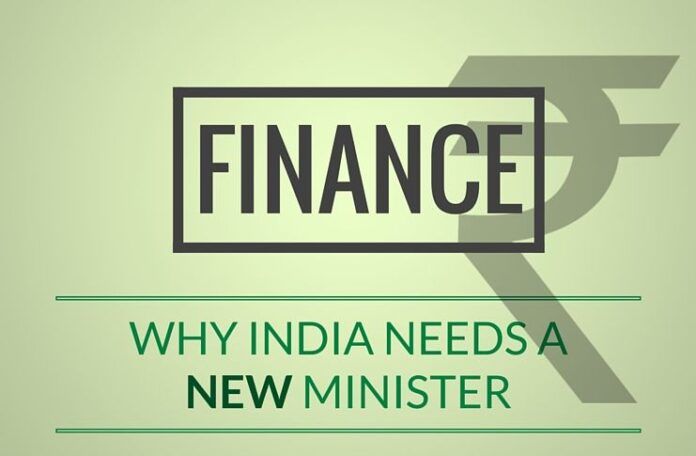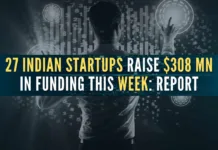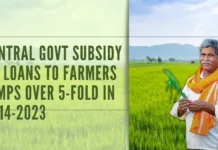
What does it take to jump start job creation and lead India to double digit growth? For a start, lower interest rates will certainly help. That is bound to occur now that Mr. Raghuram Rajan has been shown the door at the Reserve Bank of India. The next step is to usher in big bang financial reforms. For that to happen, it is crucial to have a “thinking economic man or woman” at the helm of finance ministry.
As the two year evaluation of Modi government pours in, many of the Ministries are earning kudos for working towards reducing the cost of doing business, removing impediments to start businesses and ensuring that welfare schemes reach the poor without any leakage. Ministry of Road Transport and Highways has revived many of the stalled road projects. Power Ministry has ensured availability of power as an affordable price. The Petroleum Ministry is quietly ushering in a revolution through programs such as introducing transparency in production sharing contracts, “Give it Up” LPG subsidy and facilitating distribution of gas to power sector. Other ministries have been assiduously working towards broadband connectivity, skill development, Swachh Bharat mission and smart city plans. The finance ministry has been the laggard in an otherwise smooth functioning of the Modi cabinet towards achieving development goals of the country.
The two year performance of the Finance Ministry has been lackluster to say the least. There has been no fresh thinking or out-of-the-box ideas. Instead, there has been blind aping of policies of United Progressive Alliance (UPA) on several fronts – bringing back black money, implementing gold monetization scheme, forcing PSU’s to pay higher dividends to achieve budget targets, failing to transfer benefits of lower crude oil price, allocating taxpayer money to recapitalize public sector banks and fighting inflation by raiding commodity traders. The three union budgets have also been dreary. Be it willful defaulters or black money holders, the Finance Minister has been high on rhetoric and low on action.
It is unfortunate that India has a Finance Minister who is overly dependent on an obstinate bureaucracy that prefers continuity rather than disruption. An immediate course correction is indeed warranted. It is imperative that Prime Minister Narendra Modi replace the current Finance Minister with someone who can sell reforms to citizens as well as deliver on the promises laid out in the BJP Manifesto.
What should be the economic agenda of the new Finance Minster? India needs lower personal income tax rates, longer tax holidays for startup’s, speedier resolution of non-performing assets (NPA’s) while simultaneously recapitalizing banks and implementing radical ideas to bring black money back. All these measures are bound to increase private investment critical to achieving double digit economic growth and robust job creation.
The new Finance Minister must raise the income tax limit to Rs 5 Lakh as suggested in the BJP Manifesto or abolish it completely as recommended by Dr. Subramanian Swamy. Such a measure is bound to increase savings rate that is vital for credit growth and consumption. The Information Technology boom of 90’s was successful for two reasons – generous allocation of land by state governments and a ten year tax holiday. The latter is a must to ensure the success of Modi Government’s all important “Start Up India” and “Make in India” agenda.
The new Finance Minister must change course in all the important issue of tackling NPA’s and bank recapitalization- set up special courts to punish willful defaulters and shun timing of stock market to disinvest in PSU’s. Taxpayers as well as voters are appalled at the inaction of finance ministry on willful defaulters including the reluctance to name and shame them in public. And successive Finance Ministers have never learnt the futile exercise of trying to time the stock market. Last year, FinMin sold shares in Steel Authority of India (SAIL) for a price of Rs 83. 71% of the offer was picked up by LIC India. Today the shares are available in the market for Rs 43 a loss of almost 50%. In essence, the gains for FinMin came at the expense of its own PSU-LIC. Smart investors are not fooled by market condition is an important lesson that our FinMin bureaucrats are refusing to learn.
The approach to bringing back black money has been timid thus far giving rise to an awful perception that the government lacks the political will to do so. A radical approach like nationalization of illegal assets of Indians abroad, punishing Indian operation of companies that are head quartered in countries that refuse to co-operate, scrapping of P-Notes must be tried. But that requires a new person at the helm of finance ministry.
The budget preparation for next year will start in earnest during October of this year. It is best for Prime Minister Narendra Modi to appoint a new Finance Minster who can settle in and communicate an economic vision to the people of this country as well as prepare the bureaucracy for big bang reforms before the next budget. Only an economic boom can guarantee the BJP’s return to power with a bigger majority in 2019.
Many surveys are doing the rounds as to who would be the best person suited to be the Finance Minister.
Note:
1. Text in Blue points to additional data on the topic.
- Biggest Economic Accomplishment – Ending Crony Capitalism - December 13, 2019
- Mr. Rahul Gandhi must first become a Chief Minister - April 4, 2019
- How Congress lost Karnataka - May 15, 2018











Is PM Modi listening
Out-of-the-Box thinking >>> In India, almost no “number” is correct on economic & related matters. You get a variety of numbers (with base year changing in all possible manners) in a variety of websites or in govt. documents. The numbers pronounced by political parties are absolutely lousy. So let’s not talk about it, when we talk about National Income, i.e. GDP. To correctly assess the numbers and the earnings by individuals – ideally everyone should come under IT orbit – e.g. a token 0.5% tax can be slapped on those earning 1-3 lacs that could be returned to them via gas subsidy, food stamps, etc. For those earning 3-5 lacs (Level1) the tax should be a mere 2% without any surcharge that could go to the National Banks for paying a higher interest rate to the Sr. Citizens. If that amount is not sufficient, brainstorming has to be done to bring the level to at least 9%/year for the Sr. Citizens to exist in this tumultus situation. So, you see that – one action – two objectives fulfilled.
Next for 5-15 lacs (Level2), the tax should be 10% plus 2% surcharge (total 12% – still lesser than present), For 15-25 lacs (Level3), it should be 15% plus 3% surcharge (total=18%). For over 25 lacs (Level4), it should be 20% plus 4% surcharge (total=24%, still lower than present). The deductions due to various savings (without dictating whether its housing interest, LIC, PPF, etc. — i.e. left to the individuals’ choice), it should be 2.5 lacs for Level1, 4 lacs for Level2, 6 lacs for Level3 and Rs. 8 lacs for Level4, respectively.
An ideal IT Structure could be based on the above model with some minor adjustments and this could also be followed year-after-year with some tinkering by FinMin mandarins as it is their usual habits. Compliance will be higher and GDP will also be higher at present production level – and it will obviously go up with TIME…
Shri Arun Jaitley is a big disappointment – he seems to be hell-bent on exterminating the middle-class and finishing off senior citizens.
A majority of Senior Citizens in India do not have pensions – they rely on fixed income – bank FDs etc. Shri Jaitley has cheated them and made their lives miserable by
a. reducing interest rates and reducing the income of Senior Citizens – he will now give loans to big industries who will never repay.
b. making Post Office account opening/ MIS transfer extremely bureaucratic and cumbersome – like 1980’s Raj Era. Old people now have to go to the Post Office, stand in long queue and collect their money. Why? He will give some b.s. about tackling black money. Nonsense. It is a crime to make Senior Citizens suffer because of the collosal incompetency of the Finance Ministry.
c. removed Senior Citizen concession in railways – they have to first pay full amount and then they have to claim a refund. Obviously many old people are not computer savvy and will have to go to the Railway counter, stand in long queues and manually claim refund. Then some agent/ dalaal will come and ask for commission and so on.
d. food prices touching unimaginably high levels.
BJP will lose 2019 – nobody can stop it, which will be very unfortunate. And Shri Jaitley will be one of the key reasons – apart from no Ram Mandir, no attack on Pakistan, and no resolution of Kashmir and other BJP failures.
Dr. Swamy as FM..period. The sooner PM gets it the better. Jhootly will get us no where only protect the corrupt.
4 out of 5 BJP & RSS party cadres say to me that the Finance Minister is to be replaced and either Dr Swamy or Arvind Subramaniam should be made as FM. But why they cant impress Modiji on this issue. who stops Modi to take this decision.
Full support to Dr.Swamy .. He is the only one who thinks big and can deliver big – only if Modi gets out arrogance mode and gets rid of really bad company..
The crux of the matter is to ask whether there is a central collective decision/policy in country’s financial management.Individual aberrations can occur only in the absence of a policy.Otherwise the person can be held responsible.
Even at this stage it is imperative on the part of this Govt to state its core policies and keep acheckon implementation so that anyone digressing can be replaced.
Innovative ideas are needed now to give a quantom leap to the economy.
could not agree more with the author! We need fresh thinking at FinMin and this cannot come from Mr. Jaitley.